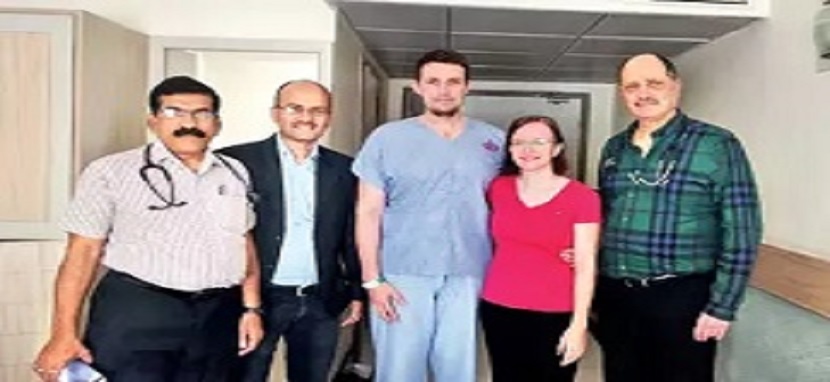
Massage triggers rare heart condition in Finn
Hautakoski Toni Seppo H — a Finnish national working for a private city firm for the past oneand- a-half years — was to leave for his country on the night of November 5, and had gone for a massage at the spa in the evening before his flight to Mumbai. Little did he know that it would trigger a heart condition that would need surgical intervention.
The 38-year-old who lived in the Bhosale Nagar Extn underwent a massive, open-heart surgical procedure in the early hours of November 6 at Ruby Hall Clinic. Doctors at the hospital performed the emergency surgery to replace a portion of his heart, which had been damaged owing to the massage, causing acute aortic dissection (a tearing of the inner layer of the aorta, the large blood vessel of the heart).
Toni was unaware that he comes from a family with a history of aortic aneurysm — wherein blood vessels in the aorta weaken and bulge, leading to heart attacks, kidney damage, stroke, and even death. After his spa appointment on November 5 evening, Toni complaind of feeling breathless with acute chest pain, and was rushed to a nearby private hospital.While the ECG report was normal,the cardiac echo showed the presence of an acute aortic dissection — an extremely rare condition to be diagnosed, where the surging of blood through a tear in the aorta leads to the creation of a false channel or blockage.When left untreated, about 33 per cent of patients die within the first 24 hours, and 50 per cent die within 48 hours. Looking at the gravity of the situation, he was then transferred to Ruby Hall Clinic.
The hospital was constantly in touch with an international team since Toni could not travel to Mumbai or even Finland. He was rushed into surgery at 1.30 am on November 6. A team of almost ten doctors, including Dr Vivek Gaikwad, Dr Purvez Grant and Dr S Munot, performed an extremely complex procedure called the Bentall Surgery.
Explaining the intricacies of the five-hour-long openheart surgery, Gaikwad, a cardiologist at
Ruby Hall, shared, “The operation included several steps in which the aortic valve was replaced
with a mechanical valve of 25 mm, the aortic root and the ascending aorta up to the descending
aorta was also repaired by creating an artificial passage. This was followed by reinserting the
native coronary arteries of the heart in the replaced part of the aorta. The procedure was
performed under deep hypothermia and circulatory arrest, during which the heart and head are
packed in ice and cooled to 18 degrees Celsius, while the blood flow to the body and brain is
stopped temporarily. This is considered the most dangerous portion of the operation, as the
patient can suffer brain death if the circulatory arrest is sustained for too long.”
Grant, cardiologist and managing trustee of Ruby Hall, added, “The medical team was able to
perform this operation successfully without any bleeding or neurological complications. With
little margin for error, the worldwide complication rate of paralysis and organ failure
accompanying this operation are up to 25 per cent, and the mortality rate goes up to 10 per cent.
We’re happy that Toni showed no signs of complications after surgery and was even discharged after
a week.”
A recovering Toni told Mirror, “I am grateful for everyone involved in saving my life. The
doctors who operated on me were very competent and the sisters in cardiac recovery took very good
care of me. My company, Alfa Laval, dear colleagues and especially family and friends have shown
fantastic support to me and my wife during this difficult time. I was touched by the personal
interest and involvement on the part of the hospital management.”
